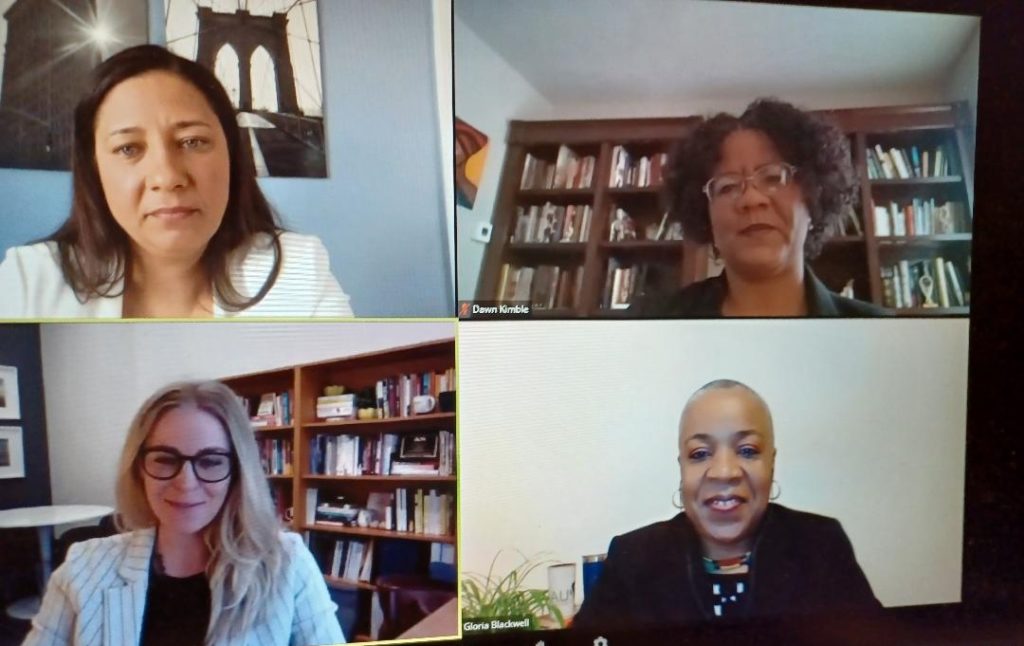by Wanda Price
“On the heels of International Equal Pay Day, this parallel event proved to be very timely. The event was sponsored by the American Association of University of Women (AAUW). The expert panel included Gloria L. Blackwell, Chief Executive Officer, AAUW; Dr. Caitlyn Collins Assistant Professor of Sociology, Washington University in St. Louis; Dawn N. Kimble, Learning and Development Professional; and Kristen Kavanaugh, Director of Inclusion, Tesla Inc. An interactive and thought-provoking discussion involving input representing the academia community, the corporate setting, and a community-based organisation.

Pictured: Speakers at Women and Work: Increasing Leadership and Economic Equity
This event addressed positive and negative aspects brought on by the pandemic and how the pandemic has served as a catalyst to shift how women and employers are approaching the changing workplace and in some respects are building a workplace that may be better for all. Also addressed was the double burden and expectations of paid and unpaid work for women. Some solutions were offered to support women’s economic participation that support equity and success in the workplace.
The conversation started with the obvious mention of the fact that women around the world have been deeply affected by the COVID-19 pandemic, which has heightened the large and small inequalities that women face daily—both at work and at home. Discussion continued by recognising that women start their adult life and work careers at a disadvantage without the use of their own voice. They are told or taught most of their life how and when to respond and act to various circumstances. They also lack access to the social support system often relegated to men or those in upper or middle management positions.
What Organisations Were Willing To Do
The impossible suddenly became possible during the pandemic. Prior to the pandemic, women who were also caretakers or who had expressed the need to work from home or somehow adjust their work schedule to flexible, were told a flexible schedule was not in the best interest of the organisation. Since the pandemic, working from home has become the norm for many individuals in a corporate setting.
For employers attempting to pivot how they would continue to conduct business, adjustments or additional benefits were provided to minimise the workflow disruption. For the employer who provided computer access from home, often noted an increase in productivity, creativity, and team collaboration. The use of virtual connections allows the employer and the work team into individual’s homes. Where family pets and children or other family members can often be seen in the background, this may create empathy and compassion and a new level of respect for the need for work life integration as a consideration when creating social service benefits.
Home based work options are beginning to open new opportunities for employer and employees. Having to relocate to new geographical area would have previously been a concern. Commuting, having to uproot families and setting up new living quarters may come to past.
Of course, working from home was not always the best option especially because low wage earners are excluded and there are situations where the home has not been a safe place. For many informal workers, the pandemic caused furloughs or the loss of their jobs altogether. There were other concerns identified where employers made assumptions on what would best benefit employees instead of consulting employees on ways to assist.
Key strategies that should not be left out
Making assumptions on what social service benefits would best benefit employees is not the best way to proceed. Instead of assumptions, employers need to make connections with employees through various means such as surveys, focus groups, or walking the floor. Two examples were shared where during the pandemic the availability of bus/travel cards were provided to an inefficient transportation system that did not help employees get to their jobs. Also, gas cards were offered but could only be used if the individual owned a car. Asking employees for input and then actively listening would have provided a more favourable outcome.
Benefit policies that are broad based, inclusive, seeks to eliminate disparities, and are gender neutral will prove to be the best policies. The male breadwinner model of the past should no longer be the concern of those responsible for employing and promoting once hired.
Getting Women in Leadership Roles
Deliberate action within the organisation is required to recognise women for their skills and talent and recommend them for projects to help them gain notice. Women should not have to beg to be included in important conversations involving their well-being.
How to make things better for working mothers?
In the US, many organisations are operating under what could be considered a ‘family hostile’ environment where no consideration is given for other life obligations entrusted to women outside of work.
There are actions that individual organisations can address on their own through the addition of social services and benefits that can be offered to employees. However, as not to create disparity in the labor force through considerable differences in social benefits offered, it would be best if local and federal legislation is passed to create benefits such as a uniform minimum livable/living wage, paid family/childcare leave, universal PreK program, and set minimum paid vacation to name a few. Certain policies should become the norm and not the exception.
Take-aways from this session
- Seek opportunities to sponsor another woman or mentor a girl. We need to lift others as we climb.
- Speak up. Find your voice. Some instances may involve connecting with others to amplify your voice.
- Expect more and expect better from employers, community, legislators, because you deserve better. We are no longer settling.”


Hi ‘SI’
I am interested and would like to know more about it.
I admire the little that I have read in these few minutes.
Thanks
Skye